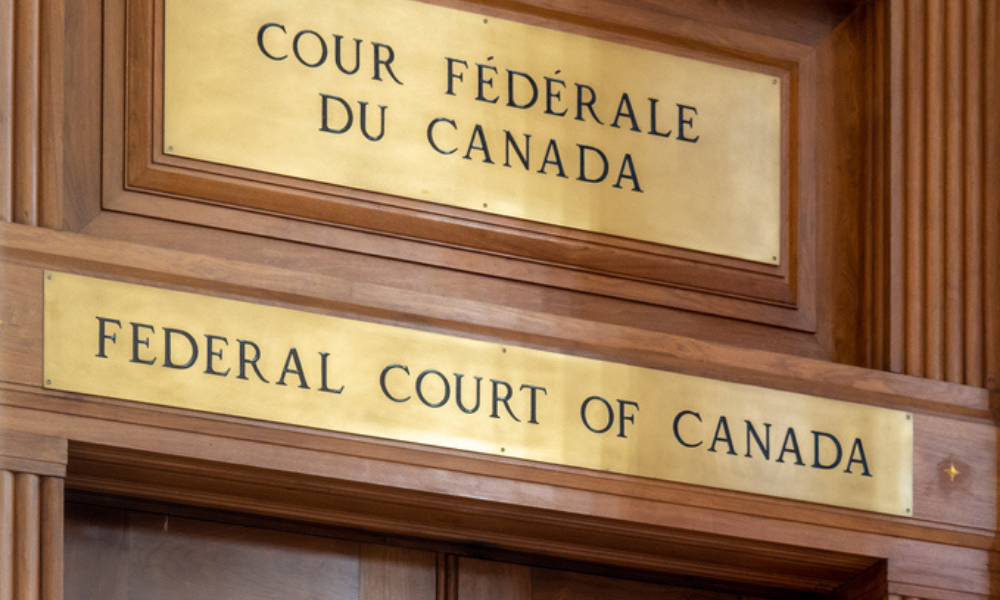Infringement and impeachment matters relating to patented medicines heard by Federal Court

This week, the Federal Court of Appeal dealt with income tax, employment, and election law cases arising from decisions of the Tax Court of Canada, the Canada Industrial Relations Board, and the Federal Court.
Federal Court of Appeal
On Monday, the court heard Scott Eashappie et al v. Terrina Bellegarde et al, A-18-23. The appellants claimed that the Federal Court lacked jurisdiction to hear the respondents’ interlocutory relief motions before deciding whether it had jurisdiction to hear the underlying judicial review application.
On Tuesday, the court heard Polarsat Inc. v. His Majesty the King, A-20-23. The appellant challenged the Tax Court’s interlocutory order granting the respondent leave to file an amended reply to a notice of appeal to raise the general anti-avoidance rule in s. 245 of the Income Tax Act, 1985 as an alternative basis.
Also on Tuesday, the court heard Astro Consulting Inc. v. His Majesty the King, A-134-22. The appellant sought to set aside the Tax Court’s dismissal of an appeal from an income tax reassessment.
On Tuesday, the court heard Michael David Sieluzycki v. Coca-Cola Canada Bottling Limited et al, A-57-22. The applicant challenged the Canada Industrial Relations Board’s finding that the Coca-Cola Bottling Company was not an employer whose employees were employed in connection with a federal work, undertaking, or business.
Also on Tuesday, the court heard Preventous Collaborative Health v. Canada (Minister of Health), A-136-23. The appellant wanted to set aside the dismissal of an application to compel the disclosure of certain documents.
On Wednesday, the court heard Kehewin Cree Nation v. Vernon Watchmaker, A-152-22. The appeal sought to dismiss the respondent’s judicial review application, where the issue was whether he properly filed an election appeal in line with Kehewin Cree Nation’s customary election code.
Federal Court
On Monday, the court heard the cases of Boehringer Ingelheim (Canada) Ltd. et al. v. JAMP Pharma Corporation, T-2276-22 and Boehringer Ingelheim (Canada) Ltd. et al. v. JAMP Pharma Corporation, T-2318-22.
These cases involved proceedings under the Patented Medicines (Notice of Compliance) Regulations, SOR/93-133. The plaintiffs sued the defendant in connection with its making, constructing, using, and/or selling of certain tablets that would allegedly infringe or induce the infringement of claims relating to six Canadian patents.
Last July, in Boehringer Ingelheim Canada Ltd. v. JAMP Pharma Corporation, 2023 FC 943, the Federal Court dismissed the defendant’s motion to compel the attendance of the plaintiffs’ employee inventors for discovery purposes.
Also on Monday, the court heard the cases of AbbVie Corporation, et al v. JAMP Pharma Corporation, T-557-21; AbbVie Corporation, et al v. JAMP Pharma Corporation, T-561-21; JAMP Pharma Corporation v. AbbVie Corporation et al., T-573-21; and JAMP Pharma Corporation v. AbbVie Corporation et al., T-577-21.
These cases involved patent infringement and impeachment actions relating to JAMP Pharma Corporation’s product, which was a biosimilar of AbbVie’s drug. Three patents were involved, including AbbVie’s Canadian patent number 2,904,458.
On Dec. 4, in AbbVie Corporation v. JAMP Pharma Corporation, 2023 FC 1520, the Federal Court issued a decision declaring that JAMP’s activities infringed the claims relating to this patent.
On Tuesday, the court heard Jude Upali Gnanapragasam et al. v. Minister of Citizenship and Immigration et al., IMM-8432-22. The applicant transferred from Sri Lanka to Canada in 1989, was recognized as a Convention refugee in 1991, and became a permanent resident in 1997.
The federal ministers of public safety and citizenship and immigration asked the court to stop or to suspend the applicant’s refugee protection until the final disposition of the underlying application.
In November 2022, in Gnanapragasam v. Canada (Public Safety), 2022 FC 1595, the Federal Court dismissed the applicant’s motion to stop the Refugee Protection Division from ruling upon this application.
Also on Tuesday, the court heard Brian Busby et al. v. Attorney General of Canada, T-1437-21. The applicants challenged the public sector integrity commissioner’s decision to stop investigating their allegations on unlawful and inappropriate activities within the Canada Revenue Agency.
On Wednesday, the court heard the cases of Lei Zhang v. Attorney General of Canada, T-731-23 and Sahilsingh Sunnysingh Sen v. Canada Revenue Agency, T-2264-22. The issue in these judicial review applications concerned the applicants’ eligibility for the Canada Emergency Response Benefit and the Canada Recovery Benefit, respectively.
Also on Wednesday, the court heard Afsaneh Saffari v. Canada Revenue Agency, T-850-23. The applicant requested the cancellation of tax assessed on excess tax-free savings account contributions.










